
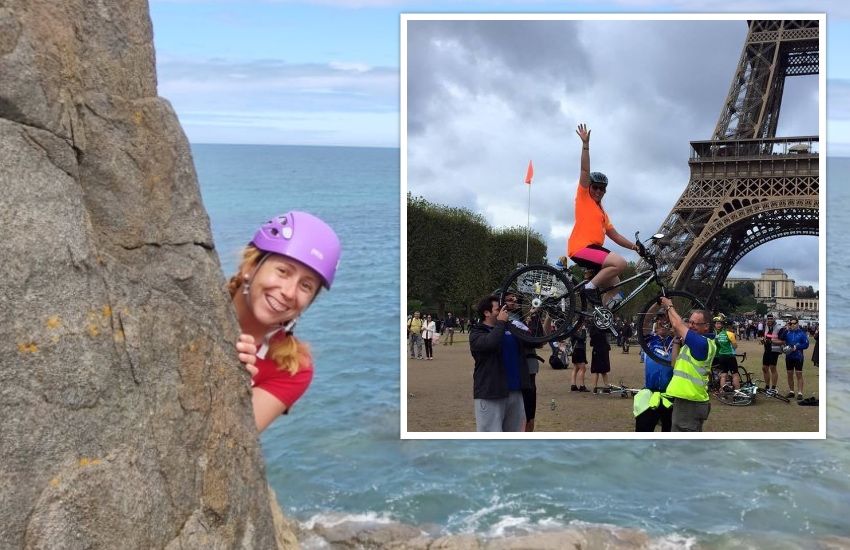

A friend since childhood, Sophie Veron’s story is one which I have been keen to share; the problem for us both was knowing where to begin. With a catalogue of rare and near-fatal health problems, more hobbies than most people amass over an entire lifetime and a relentless drive to do good, Sophie’s story seems almost a work of fiction.
Described by her mother as a “hurricane”, Sophie is either a non-stop whirlwind or asleep; there is no middle ground. Trying to keep up, or keep track, of Sophie is simultaneously exhausting and endlessly inspiring. Having to face her own mortality from a young age, she is the poster child for taking life by the horns and making the most of every day.
While I have been aware of Sophie’s health struggles over the years, to sit down with her as she listed them was a hard listen.
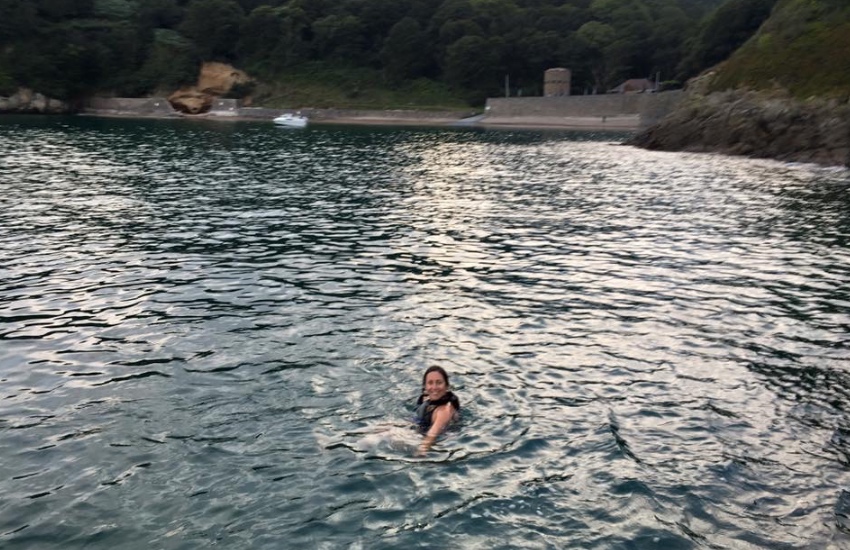
Pictured: Sophie "loves being on or in the water" and is a keen rower, swimmer and kayaker.
A 14-hour spinal surgery, hydrocephalus, 10 brain surgeries, cysts on her spinal column, chronic fatigue, four Medivacs off the island, unconscious for three weeks, living with a brain injury and the physical limitations of two titanium rods holding up her spine, Sophie has had far from an easy ride.
“When I was 13, I was diagnosed with scoliosis; within a few months, it had gone from a small curve to my spine being S-shaped. I underwent a 14-hour surgery to straighten my spine and had titanium rods screwed up and down either side of my spine,” said Sophie.
WATCH: Sophie's outdoor climbing was featured in a video by Climb LBG. (Credit: Climb LBG)
Sophie continued: “The rods mean that I am limited physically in what I am able to do. The evening before the surgery it hit me that I would never be able to do a cartwheel again; it’s funny the things which pop into your head. The hotel we were in had a massive bathroom and I have such a vivid memory of doing cartwheels knowing they would be my last.”
While Sophie had anticipated some of the consequences of the surgery, she later found that she had developed chronic fatigue syndrome as a consequence.
“Chronic fatigue is your body’s reaction to experiencing extreme trauma. It reached the stage where I was hardly ever awake; my family had to wake me up for meals then I would go straight back to sleep,” said Sophie.
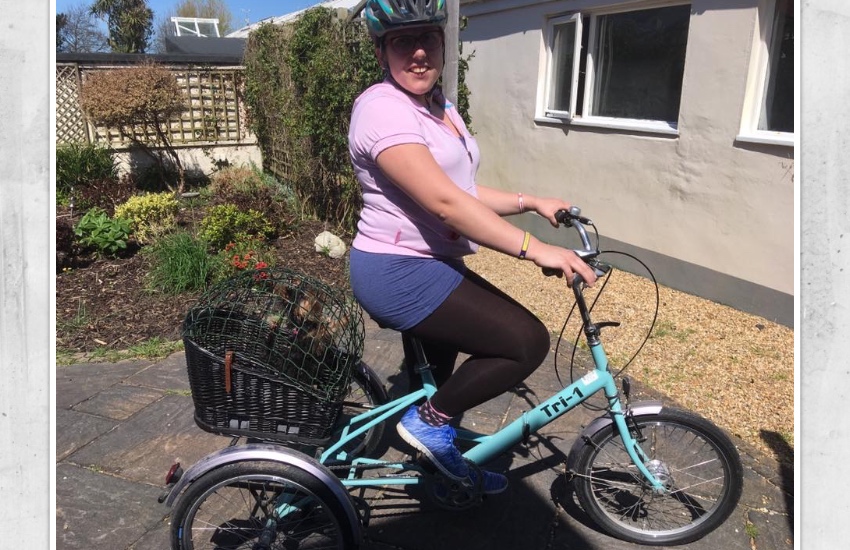
Pictured: Sophie's balance issues meant she was unable to ride a bicycle, but she adapted to this challenge by riding a tricycle.
Sophie continued: “I ended up missing two years of school. I went back part-time and completed my GCSEs then went to the Sixth Form Centre to take my A-levels. That’s when things started to go very wrong.”
Sophie started to experience co-ordination problems. “Around 17 or 18 I started falling over. My balance became progressively worse over the course of a year where I eventually had to walk either with two sticks or was in a wheelchair,” she said.
“It took a year for me to receive a diagnosis. It was a scary time because I, of course, assumed the worse. There are only so many illnesses which cause that level of deterioration so I thought I must have cancer.
“I was eventually diagnosed with hydrocephalus, which is a build-up of fluid on the brain. I was flown to Southampton for brain surgery. When I went into the hospital, I had my mum on one side and my dad on the other holding me up. Three days later, I walked out of the hospital unaided; it was amazing.”
Sophie had a shunt implanted, which continually drains fluid from her brain to her abdomen. If left untreated, hydrocephalus can be fatal. While saving her life, complications with Sophie’s shunt has almost cost her it on several occasions.
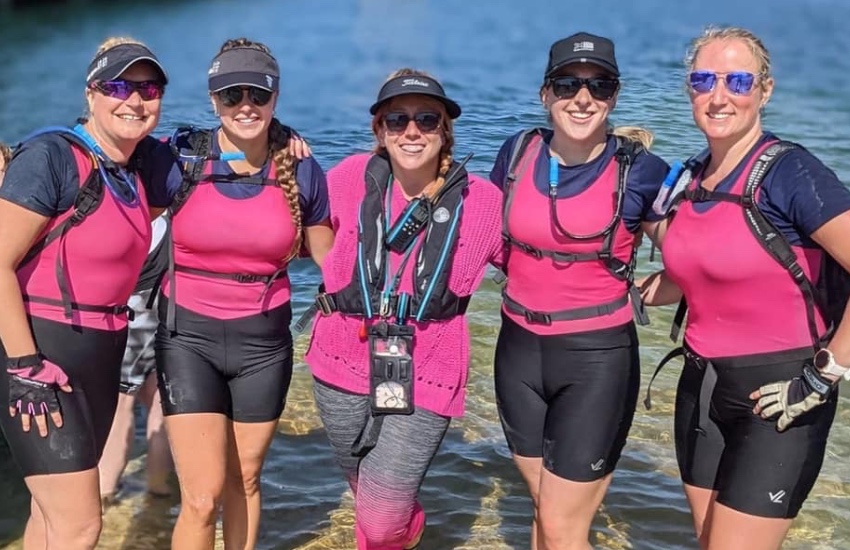
Pictured: Sophie is the Coxswain for the Oars4aCause coastal rowing team.
“If my shunt isn’t working properly, I only have a 24-hour window to get medical help before it would be fatal. I love living in Guernsey, but it does cause an issue in some regard because no one can fix my shunt on-island, so a chunk of time in the 24-hour window is taken up getting to Southampton when something goes wrong,” said Sophie.
“When something is wrong with the shunt, I very quickly become unaware and unable to help myself. It is usually my family or friends who have first spotted when something is wrong.
“There was one instance where I woke up in the morning and my eyes were bulging out my head like a cartoon character, but I said I was feeling fine and my mum had to rush me to the hospital. Another time, I was staying with a friend in Norfolk and she noticed that I was acting strangely.
“Her family rushed me to the local hospital where staff thought I was drunk. My friend had to explain that I can’t drink any alcohol [because of the shunt] and something was seriously wrong. I was blue-lighted to Cambridge for emergency surgery.”
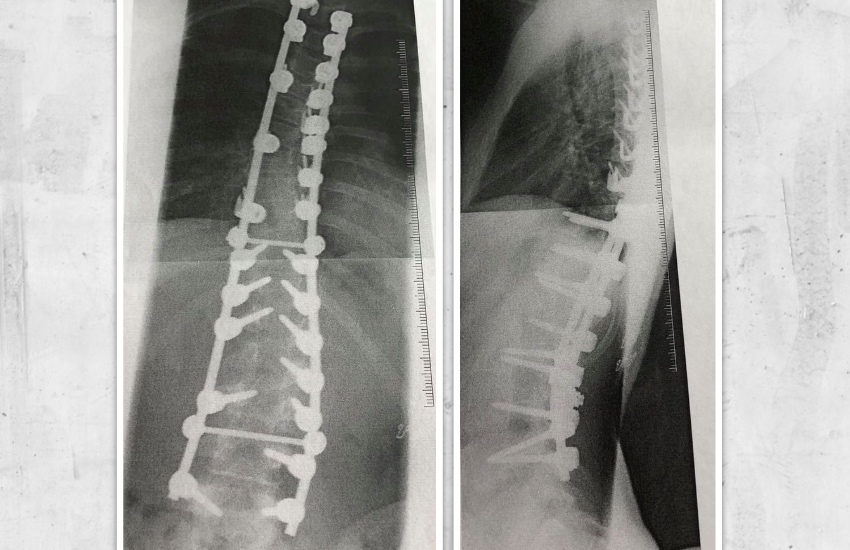
Pictured: Sophie marked the 15 year anniversary of her spinal surgery on 19 October 2020 by sharing x-ray images of the titanium rods in her spine.
On another occasion, Sophie was taken by Medivac to Southampton and spent three weeks unconscious in hospital.
“Everything I have been through has always been much harder on my family than on me. Often, I am not aware of what’s happening, they are the ones left to face the situation,” said Sophie.
“When I eventually woke up after three weeks, I didn’t know anything had really happened and I was asking what I had missed in Neighbours. Meanwhile, my mum and dad had been by my bedside not knowing if I would wake up.
“There was another time where I was rushed to Southampton for surgery, sent back to Guernsey and then, 12 hours later, was in the Medivac again in a critical condition.
“When it’s happening to you, you only have two options; accept or wallow. I have always chosen to accept my situation and get on with it.
“Being in hospital and going through recovery can be all-consuming; you are in constant ‘hospital mode’. I would spend a lot of time thinking about what goals I wanted to set for myself; it started as small things like being able to go out for an ice-cream. Over time, those goals have become bigger and bigger; I love having things to look forward to and work towards.”
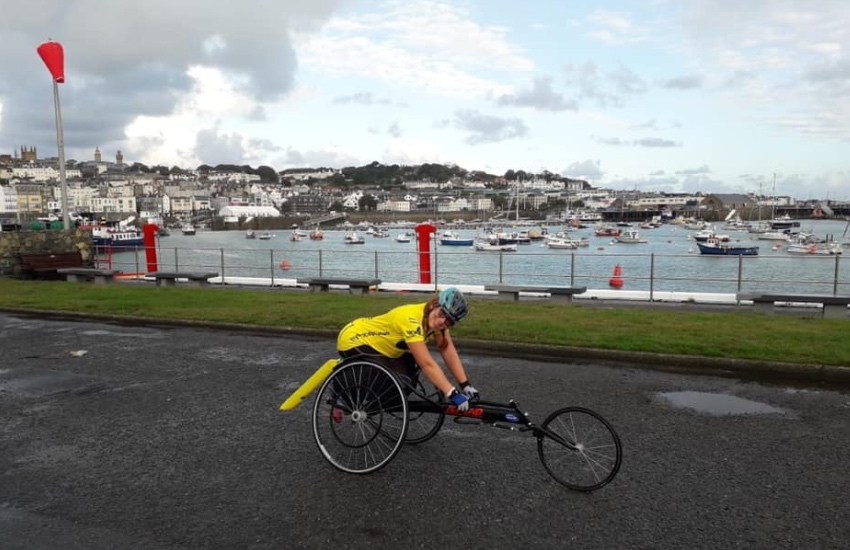
Pictured: Sophie undertook the Virtual London Marathon in a racing tricycle, wheeling her way 26.2 miles around the island in aid of the charity Shine.
It is certainly safe to say that Sophie’s mission to “get on with it” has gone above and beyond what anyone anticipated would be possible for her.
She has cycled from London to Paris on a tricycle [her balance issues not allowing her to ride a bicycle], taken part in triathlons, kayaked around the island, completed a virtual London Marathon, founded a charity, undertaken outdoor climbing challenges and, most recently, cycled 160 miles around Devon in five days.
“I am super lucky and so grateful for the life I have; I love to challenge myself and make the most of every day. I never want to take my life for granted,” she said.
“I spent so long not being able to do anything that I am driven to try and do as much as I possibly can when I can. There’s a whole world out there and I want to see as much of it as possible. I might not be able to do things the regular way, but I can always find a way around it.
“I’m not very good at doing nothing, even if I’m at home I’ll be making jam, sewing, painting or baking cakes. Sometimes I bake so many I struggle to find enough people to hand them over to. With the shunt there are some things I will never be able to do, like jump out of a plane or bungee jump, but there is still a lot that I can do.”
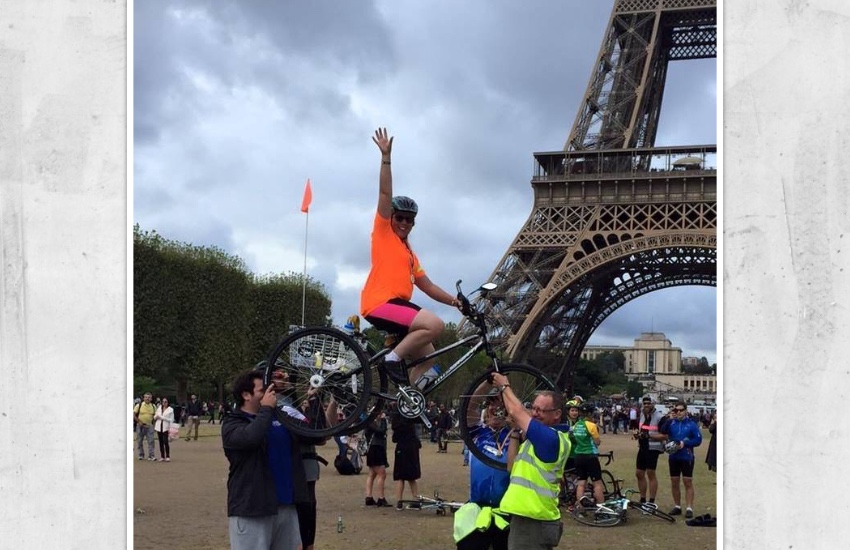
Pictured: Event organisers of a cycle from London to Paris said that Sophie was the first person to ever complete it on a tricycle.
Sophie said she was particularly inspired taking part in three para-triathlons. “Everyone taking part in para-triathlon has the same mindset; we see the ability in disability. It is so incredibly motivating and inspiring to be around people who are making the most of what they have and achieving amazing things,” she said.
Sophie’s drive to make the most of her life led her to challenging herself to what she dubbed a “30 before 30” challenge, in which she tried 30 new experiences in the year leading up to her 30th birthday.
“I did so many amazing things; I had cooking lessons, tried woodturning, went on a helicopter ride, did jewellery making and went outdoor climbing,” she said.
“I loved the climbing so much that I continued with it and took part in a charity 30 climbs in 30 days. I even did a climbing route in Herm which had never been done before, which is now called ‘Sophieslab’. There is definitely a thrill in trying something new; it’s exciting. Now that I have done that route, other people will be able to do it too and know that it’s possible.
“I have set myself a challenge of undertaking a ’40 before 40’, but this time I will be doing it over the decade instead of in one year. Any suggestions for things I can try are always very welcome; I’d love to hear people’s ideas.”
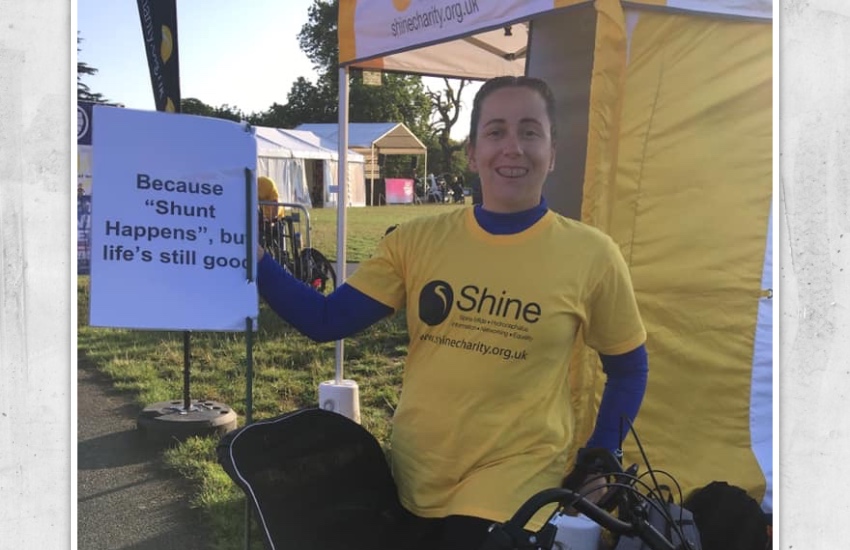
Pictured: Sophie is endlessly good-humoured about her health struggles.
Sophie has also found a way to adapt to allow her to take part in rowing. “I love being outdoors and in or on the water. I wanted to try rowing, but I knew that the rods in my back wouldn’t physically allow me to do so. Instead, I became a coxswain, which is the position where you don’t row, but steers the boat and motivates the rowers.
“I’m part of a, all female coastal rowing team called Oars4aCause and we all have the same incentive to make a positive impact on and off the water.
“I also love swimming. I can’t float since the spinal surgery, so I always have to have a floatation aid, but I am in the water as often as I can be.”
A horse-lover from a young age, Sophie has found ways to adapt to keeping horses in her life despite her physical limitations.
“After my spinal surgery, I was told that I could ride but that it would need to be with a lot of caution. I was very lucky that my first horse, Brillo, lived in my back garden when I was recovering so I could still see him every day,” said Sophie.
“When Brillo passed away, I still wanted horses but knew that I wouldn’t be able to have one to ride. After some research, I decided to adopt a Shetland pony, Stan. Stan was a driving pony who could do carriage rides so that gave me a way to still have a hobby with him as well as having cuddles and spending time with him.”
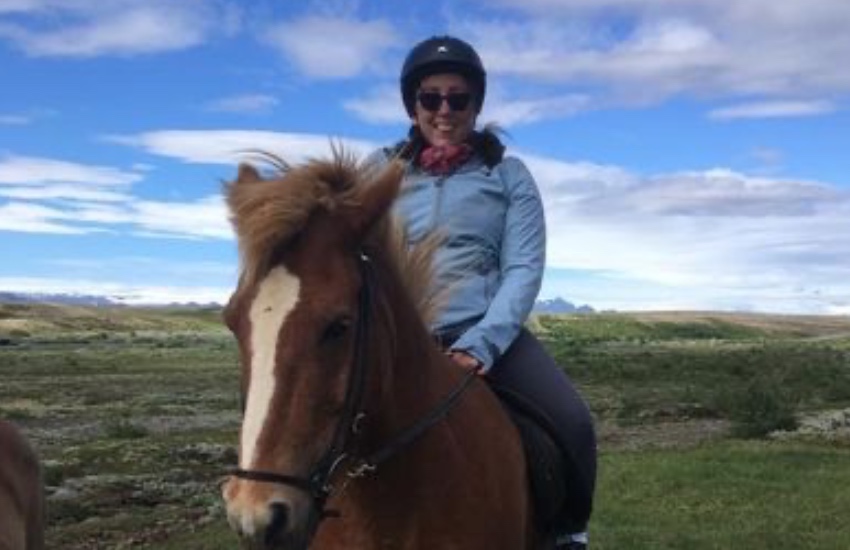
Pictured: While Sophie has to be cautious, she is still able to rise horses. She is pictured on an Icelandic pony, which she rode to Gullfoss waterfall.
Since welcoming Stan into her life, Sophie has had several other Shetland ponies come in and out of her life, including one which Sophie has raised from a foal. One of her ponies, Dolly, inspired Sophie to found the charity Sophie’s Smile Ponies.
“I would see how people’s faces would light up when they would meet Dolly and she would love the attention She has a brilliant temperament and it gave me the idea that perhaps she would make a good therapy pony,” said Sophie.
“I wanted to give something back to the community and I knew that not everyone can afford to spend time around horses and ponies. I set up the charity to give everyone the same opportunity to meet Dolly.”
Sophie’s charity is in its third year and has seen Dolly visit care homes, schools, hospitals and sessions with people with additional needs. “It’s a hugely rewarding experience to see the impact that Dolly has on people,” she said.
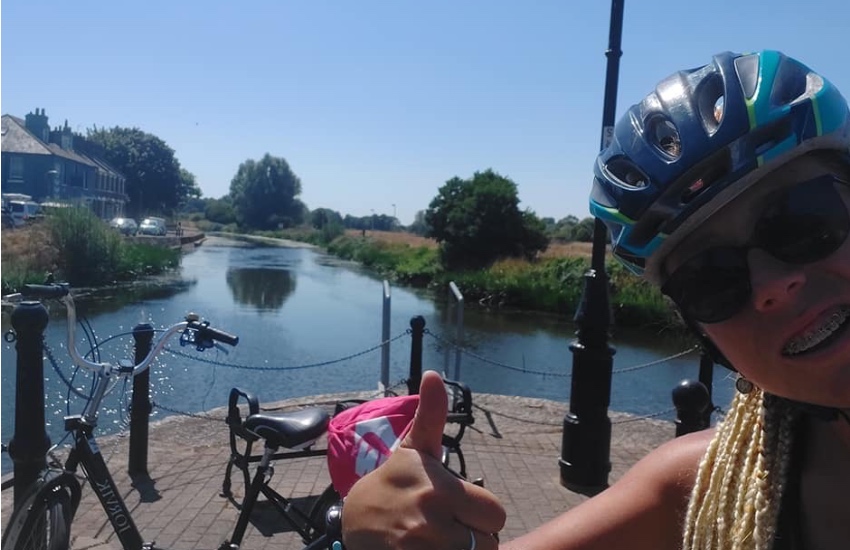
Pictured: Sophie recently cycled 160 miles through Devon over five days.
Despite her health struggles, Sophie attended university and became a veterinary nurse. After several years, she changed careers and is now the Family Liaison Officer at St Sampson’s High School.
“I love my job. I love working with families and kids and helping them navigate their journey through school. That journey is not always easy, I have experience of that myself,” she said.
It would perhaps be an understatement to say that Sophie lives a full life. While overcoming more adversity than most of us will ever face, she also had to come to terms with life with a brain injury.
“Brain surgery is traumatic and, even when it’s successful, you are left with lasting injuries. When I was recovering, I suffered from fatigue, memory loss and a brain fog. Eventually, I engaged with Headway [a local charity supporting people with brain injuries and their families] and that changed everything,” she said.
“I worked with them for a couple of years and they gave me coping strategies and made me realise that it was ok to give myself time to recover."
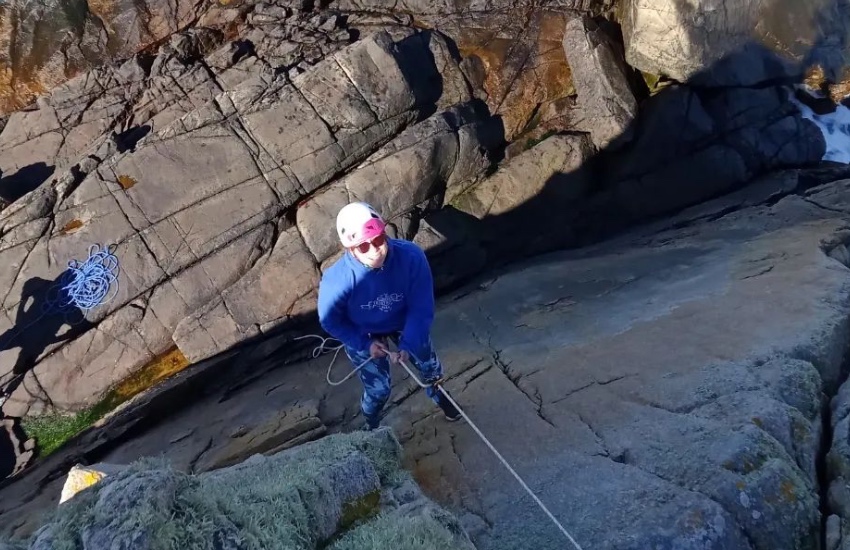
Pictured: Sophie is an avid outdoor climber and undertook a new route in Herm, which was subsequently named after her.
Sophie continued: “As far as I know, I was the only person my age with the kind of brain injury I have. Hydrocephalus is normally only ever the result of an accident or stroke in older people, or something that you can be born with. My situation was extremely rare.
“It was not easy to be 18-years-old with a brain injury, but Headway was incredibly helpful.”
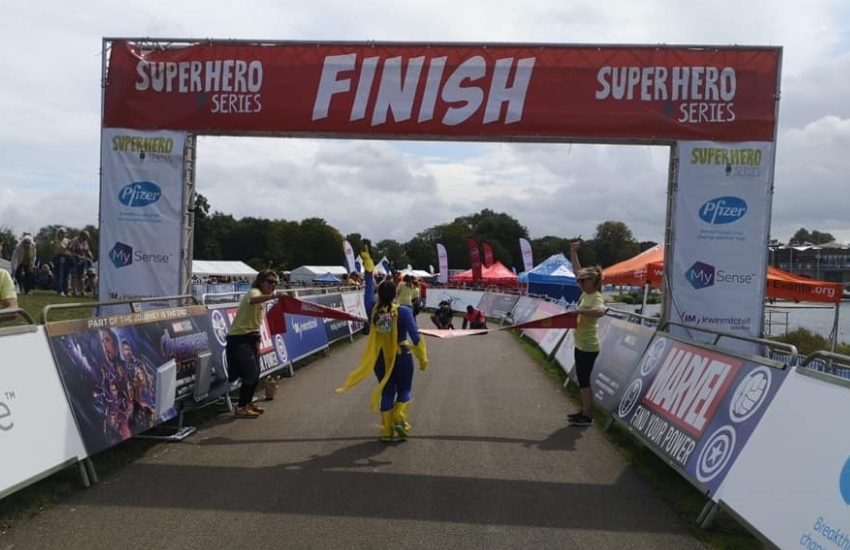
Pictured: Sophie said taking part in para-triathlons alongside other people with disabilities was "inspiring".
While Sophie could easily be forgiven for being negative or despondent, she couldn’t be further in the opposite direction.
“What I have been through has taught me that it’s important to make the most of what you’ve got. I feel as though I have an advantage in being able to appreciate what I have because of what I’ve been exposed to,” she said.
“It might not be easy to understand from the outside, but I am so lucky that I am still here and that I’m able to do things. I am extremely grateful to my family because they have always fought my corner and are extremely aware of noticing when something is going wrong. I am so lucky to have them; without them I would feel a lot less safe.
“I have an awesome life and I am so incredibly grateful for it.”
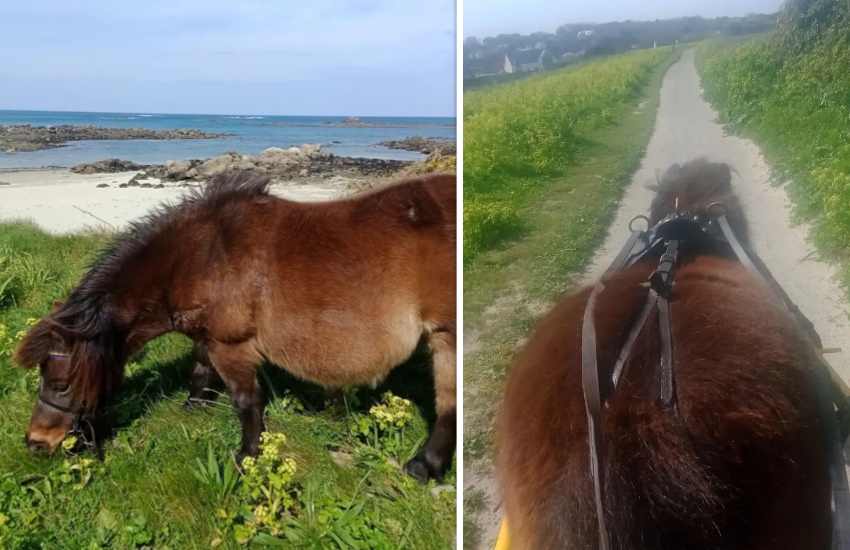
Pictured: Sophie has raised her Shetland pony, Lola, since she was a foal. Lola is now a driving pony and Sophie enjoys carriage rides with her.
POPPY'S PEOPLE: “Life must go on; I will never give up”
POPPY'S PEOPLE: “I have no idea what’s going on, but I’m not ok”
Comments
Comments on this story express the views of the commentator only, not Bailiwick Publishing. We are unable to guarantee the accuracy of any of those comments.